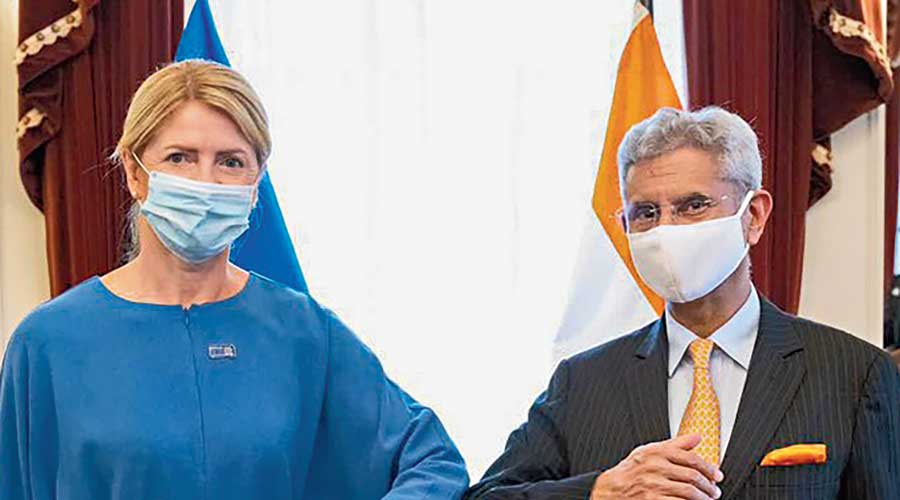
Jaishankar blamed for blundering : Modi government’s responses to Afghan evacuation draws criticism
Don't Miss
 |
| S Jaishankar meets Estonia foreign minister Ava-Maria Liimets in New York.: PTI |
It was courtesy the American armed forces that Indian mission staff were even able to bail out.
It is evident that the swift and easy sweep of the Taliban over the Afghan capital left governments across the world numb and nonplussed. In India, it has raised sharp and critical questions over the Narendra Modi government’s anticipation and responses — logistical, strategic and diplomatic.
The blame for blundering has come to stick no less because the foreign office is helmed by S. Jaishankar, a widely-experienced former foreign secretary.
“It is too early to analyse the medium and long term implications of this radical shift in our neighbourhood, but forget that for the moment,” a career diplomat told The Telegraph.
Former ambassador to Afghanistan, Vivek Katju, put it more bluntly: “I have been arguing for years that we should have opened negotiations with the Taliban, more so after it became apparent to everybody that their takeover of Afghanistan was imminent. I mean the Americans were talking to them across the table, why didn’t we? Others have articulated the same advice but it got no attention from the current framers of foreign policy.”
Asked if India would not have legitimised the Taliban by talking to them, Katju said: “Look, what’s foremost is your national interest and how you serve it. There are principles and very often there are the requirements of pragmatism. After all, you often negotiate with your enemies as well, that does not mean you are embracing them or their ways. Where have we left ourselves in Afghanistan today?”
Another former ambassador to Kabul, Rakesh Sood, expressed similar misgivings during a panel discussion hosted by The Print on Tuesday. He blamed the establishment for “putting all its eggs in one basket (meaning the US basket, or the abdicated Ashraf Ghani basket)” and said that India could have thought it out much better for itself. He also felt New Delhi should have “engaged” with the Taliban. In the context of India’s scrambled exit from Kabul, Sood said New Delhi could have planned the evacuation in a much more organised way.
Speaking on condition of anonymity, a foreign policy think-tank scholar said: “We could have done many things to avoid the mess we are in, but we did not. India is a regional power, it has leverage, it has resources. We could have pressed the US to not quit in such haste, at least demonstrated our reservations. We could have prevailed upon Ashraf Ghani to give way, or if not that, open up decision-making to a larger body like a shura, a broader council of Afghan elders, to achieve a smoother transition. Instead, we merely toed what the Americans were doing and what Ghani was falsely promising he would do to resist the Taliban advance.”
There has, of course, always been a strong counter-argument in the Indian foreign policy establishment to any engagement with the Taliban.
Back in 2018, India had sent two representatives — Amar Sinha, former ambassador to Kabul, and T.C.A. Raghavan, former envoy to Islamabad — for talks on the evolving future of Afghanistan to Moscow. “They were sent with express instructions to not even look at the Talibanis on the table,” a foreign policy insider said.
Deep reservations about the Taliban in the Indian establishment spring not merely from their bellicose Islamist and militarist mien; they are equally, if not more, predicated on the Taliban’s close ties with Pakistan and a deep, and justified, scepticism about establishing trust with the mainly Pashtun militia which now holds sway over most of Afghanistan.
The conviction that the Taliban will forever do Pakistan’s bidding even if India were to try and make deals with them, runs strong across South Block.
As another former ambassador, Deb Mukharji, said: “Look, the Taliban know where India stands in relation to them, you cannot sweet-talk them into deals, and they are not reliable people. This is a very difficult area for many reasons. But that said, if we had not blindly followed the US script in Afghanistan, we probably would have known better.”
 |
| The ITBP sniffer dogs Maya, Ruby, and Bobby have returned to India from Afghanistan |
The K-9 sniffer dog squad was deployed at the Indian embassy in Kabul with 150 paramilitary personnel. After the Taliban seized the country, they were airlifted along with the ITBP personnel, 30 diplomats and civilians from Kabul as India evacuated its embassy staff on Tuesday.
The three dogs were brought to Delhi on Wednesday from Jamnagar where the Indian Air Force plane had first landed.
Sources in the ITBP said the sniffer dogs had served the paramilitary force at the Indian embassy in Kabul for three years and had a challenging task in ensuring the safety and security of the staff.
“The canines were trained at the National Training Centre for Dogs and were deployed in Kabul in 2019,” said an ITBP official.
The dogs, the official said, had detected several IEDs during their service in Kabul.


0 Response to " Jaishankar blamed for blundering : Modi government’s responses to Afghan evacuation draws criticism"
Post a Comment
Disclaimer Note:
The views expressed in the articles published here are solely those of the author and do not necessarily reflect the official policy, position, or perspective of Kalimpong News or KalimNews. Kalimpong News and KalimNews disclaim all liability for the published or posted articles, news, and information and assume no responsibility for the accuracy or validity of the content.
Kalimpong News is a non-profit online news platform managed by KalimNews and operated under the Kalimpong Press Club.
Comment Policy:
We encourage respectful and constructive discussions. Please ensure decency while commenting and register with your email ID to participate.
Note: only a member of this blog may post a comment.